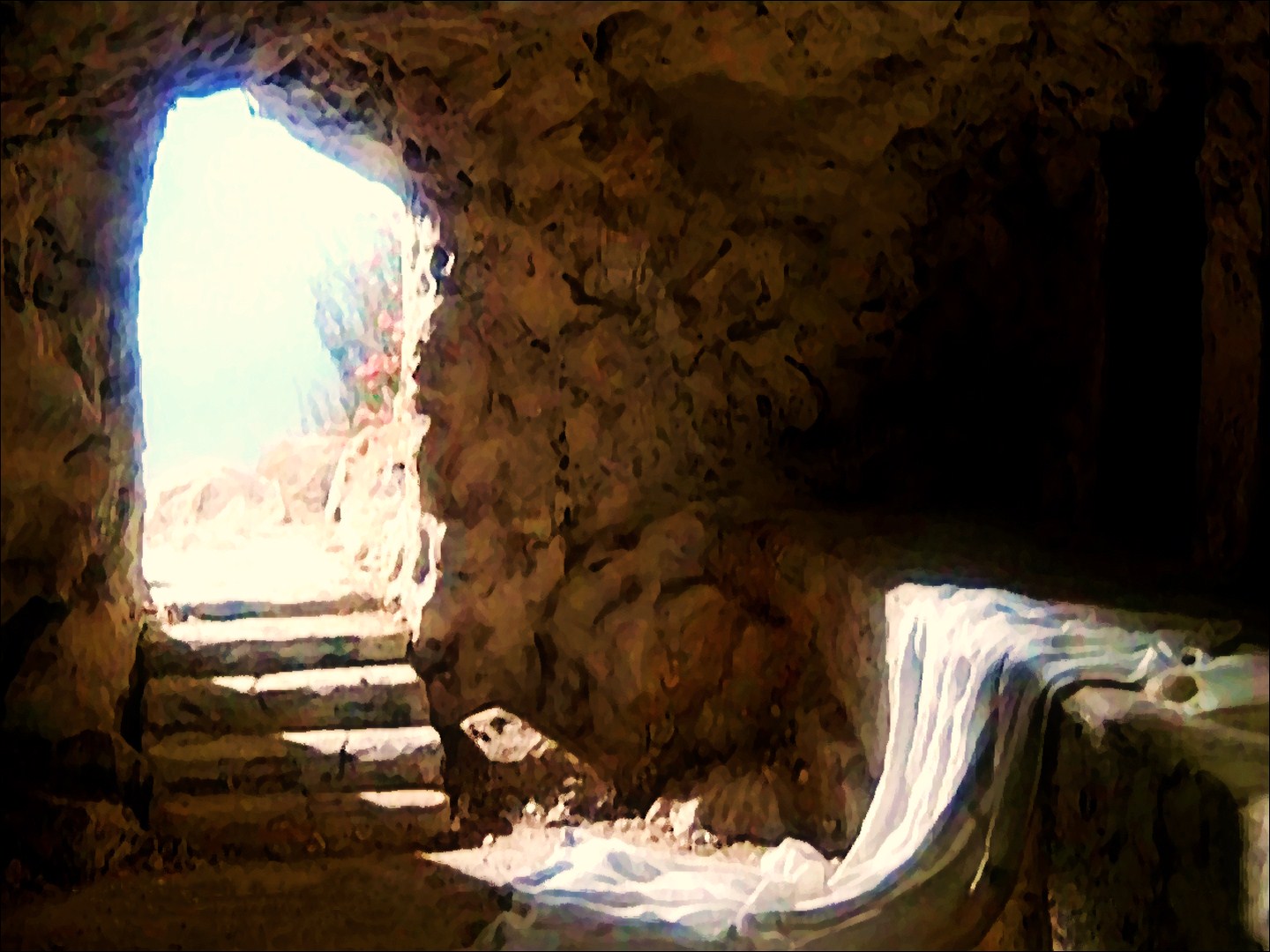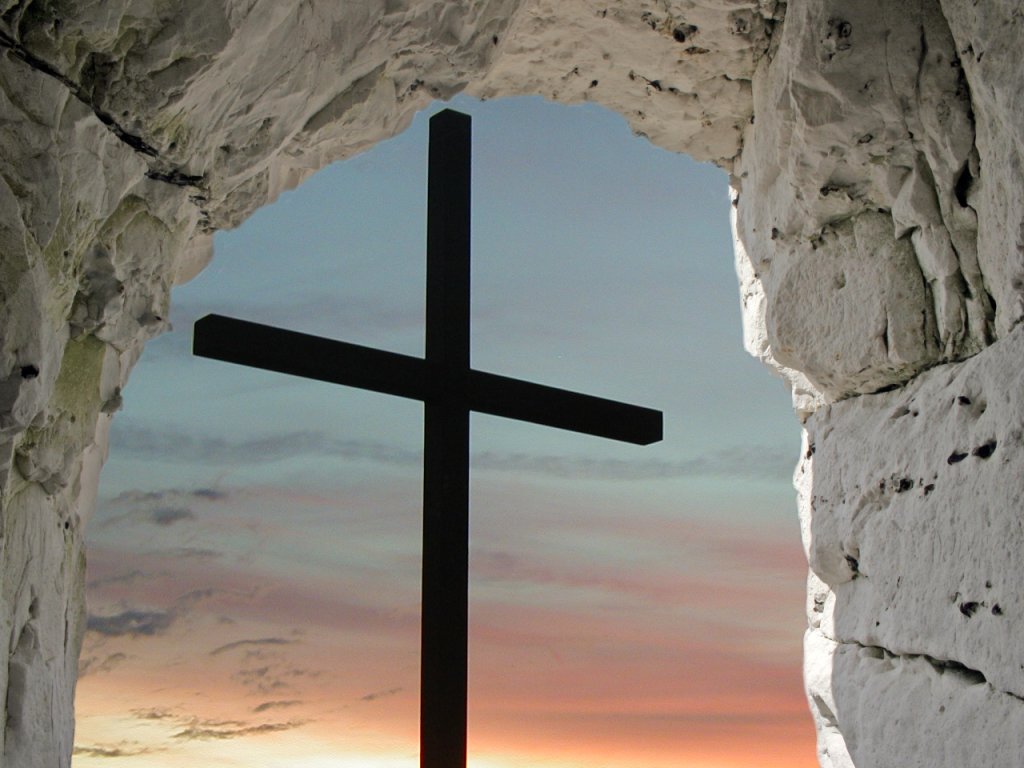 Repost 2011,
Repost 2011,  Resurrection
Resurrection  Sunday, April 5, 2015 at 05:00AM
Sunday, April 5, 2015 at 05:00AM  From Gandalf the Grey to Harry the Potter, resurrection is all the rage. Anyone can do it, as long as you’re a fictional character.
From Gandalf the Grey to Harry the Potter, resurrection is all the rage. Anyone can do it, as long as you’re a fictional character.
Reality is another matter: God became man: daring, but commonplace among the gods of the ancient world. God suffered the shame and agony of a torturous death: more scandalous, because when the gods become men they usually stack the deck in their favor. But God--risen from the dead? Still fully Man and fully God? That’s off the charts.
There is a Man seated on the throne of heaven: born of a woman, toiled in sweat, bled and died, risen in body, seated on the throne, and still human, always divine. God begot himself, and he sits enthroned, surrounded by humanity worshipping the image of God in a Man, because that Man is God.
Not everyone thinks so. Consider theologian Marcus Borg: “What would it mean to say that the risen Jesus is a physical/bodily reality? That he continues to be a molecular, protoplasmic, corpuscular being existing somewhere? Does that make any sense? How can the risen and living Jesus be all around us and with us, present everywhere, if he is bodily and physical?” I’m not fit to carry Dr. Borg’s theology books, but yes, Marcus, it makes sense to me.
Perhaps you’ve never taken time to consider the possibility: there’s a Man on the throne of heaven because a Man was raised from the dead. He is the Last Adam and the firstborn over all creation. He completes the work of creation in the Garden, and begins the work of the New Creation, anticipating the day when there is a new heaven, a new earth, a new Jerusalem, filled with people, each born of woman, each worshipping their Older Brother. This means that Easter is not only about the Father has done in Jesus Christ, it is also about what awaits us.
The Apostle Paul riffs on this very idea in First Corinthians:
But Christ has indeed been raised from the dead, the firstfruits of those who have fallen asleep. For since death came through a man, the resurrection of the dead comes also through a man. For as in Adam all die, so in Christ all will be made alive. ~ 1 Corinthians 15: 20-22
Anticipating Mr. T by nineteen centuries, Paul pities the fool who only follows Jesus in this life, without hope for a life to come--a literal, physical, “corpuscular” life in the next age. He assures us that the bodily resurrection of Jesus is not only Jesus’ victory over sin and death, but also the Father’s promise that we, too, will be raised up in the same manner as Jesus: that is, in a corpuscular body. (In my disagreement with Marcus Borg I’m grateful that he has taught me a new word. I learned, too, that some of us are more corpuscular than others. And it’s fun to say. Try it: “corpuscular.”)
In this resurrection chapter Paul teaches us that every kind of body has a “splendor.” Animals, birds, fish, and men had splendorous bodies. But the world has only gotten a short preview of the most splendorous body of all: the body of Jesus, the risen Lord. It is an amphibious body, capable of operating in this age and the age to come. The body of the risen Jesus could walk, talk, eat, and drink, yet it was not constrained by bothersome things such as doors and locks. The body of the risen Jesus was frightening, beautiful, and strangely unrecognizable--until he spoke your name or broke the bread of life, after which you wonder why you didn’t know it was him from the start. It is a body that can be seen with human eyes, hugged by human arms and touched with human hands.
The body of the risen Jesus exerts dominion over sickness and death, yet strangely bears the scars of its earlier existence. I have marveled at this for decades: the Father raised the body of Jesus to life, but chose to leave the scars of crucifixion in place. It tells me that we will carry the memories of our suffering from the past into our resurrected life, but the pain will be gone. In fact, the scars will become part of our testimony to the greatness of God. There is hope for every suffering person their pain will be fuel to burn with testimony for Jesus.
Paul tells us that the good news of the Resurrection is first about Jesus and the glory of God, but that good news teaches us that we, too, will have a splendor and glory of our own, which we can offer to him in the age to come. This weekend, when we consider the majesty of Jesus: God, Man, Savior, and King, we can also catch a glimpse of the place he is preparing for us as well.
 Monday, May 6, 2013 at 11:55AM
Monday, May 6, 2013 at 11:55AM  Christianity without the cross is a sham, but the cross is not enough. You heard me: the cross is not enough. Before the cross came incarnation, and after the cross came resurrection: Jesus modeled all three, and so should we.
Christianity without the cross is a sham, but the cross is not enough. You heard me: the cross is not enough. Before the cross came incarnation, and after the cross came resurrection: Jesus modeled all three, and so should we.
I’ve watched recently as an increasing number of teachers and leaders encourage us to follow Jesus’ example by going to the cross. Our Lord is a model—the model, actually—of self sacrifice and humility. This much is true: he is our example, and he went willingly to the cross. He didn’t miscalculate, he wasn’t blindsided by people or events beyond his control. No one took his life from him: he laid it down freely, and so should we.
Before the cross, however, all of heaven gasped in wonder at the miracle of Incarnation. The Creator become part of creation. He did not stand afar off and offer advice, he became present in his world. He arrived in the usual way for a man, and the most unusual way for God. Nor did he simply drop in for a weekend redemption spree. He lived life to the full and left a record of how we should live. This part of his example required humility and sacrifice as well.
The Apostle Paul tells us the message of the cross is foolishness to those who are perishing. The cross, he says, is a scandal to the religiously minded and ridiculous to the wisdom of this age. The world does not value humility and sacrifice, but they are the calling cards of another realm. Still, Paul did not leave Jesus in the grave, nor did the Father. To win by losing is an oxymoron. But Jesus didn’t win by losing. He won by winning, and the winning came by the resurrection.
Jesus’ example did not end with the agonizing beauty of his tortured death. His final words on the cross were not his final words. He had much more to say, and plenty for us to do. His work beyond the cross required the Father’s intervention in his life, and our work should require no less. Have you ever considered the humility and faith Jesus displayed by placing his future in the Father’s hands? Jesus died in faith, trusting in the Father’s promise of resurrection, but he had no guarantee beyond the love and trust he exhibited that night in Gethsemane. In this, too, we can follow his example. The Spirit of God is hovering and poised to infuse our lives with resurrection empowerment even now.
No witness is complete without these three vital elements: incarnation, sacrifice, and resurrection. Our attempts at ministry are incomplete without the three. We cannot stand far off and offer advice. We cannot follow Jesus without bearing the cross, and we cannot carry on his work without the Father’s intervention. Our tendency, though, is to prefer one of these above the rest. This week’s mediation asks of us: which is our default position, and how can we make room for the other two aspects Jesus modeled?
 Thursday, April 5, 2012 at 12:11AM
Thursday, April 5, 2012 at 12:11AM  When was the last time your day was interrupted by impossibly good news? We suffer interruptions all the time. We plan our day and set our tasks, then the interruptions come along one after another. Yet some interruptions are a good thing: Luke 24 reminds us that when we least expect it, Jesus himself would like to break in.
When was the last time your day was interrupted by impossibly good news? We suffer interruptions all the time. We plan our day and set our tasks, then the interruptions come along one after another. Yet some interruptions are a good thing: Luke 24 reminds us that when we least expect it, Jesus himself would like to break in.
You know the story. Two guys, despondent over the death of Jesus, make the long walk from Jerusalem to Emmaus. They are leaving the city. Worse: they are leaving their dreams as well. They had dared to place their hope in someone else, and those hopes have been crushed. They were returning to the routine and the mundane, each convinced that they should never let their hearts get carried away again. The road from Jerusalem to Emmaus is downhill. It’s not a difficult walk, but then, the pathway to despair and broken dreams is always downhill.
Amazingly, Jesus joined them on that path. Even though they were headed the wrong direction, away from the glory and majesty of death’s defeat, Jesus sought them out. They expected to walk alone, but the Father wasn’t about to leave them trapped in despair, so he sent them a Perfect Stranger. They didn’t recognize him, perhaps because when we are caught up in our own disappointment nothing ever looks right.
The Stranger began to interact with them, asking what they considered to be stupid questions. They were astonished to think anyone could have missed the significance of the events in Jerusalem. They thought they knew the score when in fact they were the ones who were clueless. They had even heard rumors too good to be true, and because those rumors were impossibly good news, they had chosen to head back to their old life.
Even though they had given up, Jesus had not. They were strangers to hope, but their fellow-traveler began to explain the truth. Gradually the road began to level out, and their hearts began to burn. Finally, as they reached their destination, they made an important decision. Despite their own sadness and disappointment, they invited the Stranger to share a meal. They welcomed the interruption. They welcomed the Stranger.
You know the rest: Jesus reveals himself. They are amazed. They recognize the old burning in their hearts, and they head back to Jerusalem to deliver impossible, ridiculously good news. They had walked slowly down the Way of Despair; now they raced up Burning Heart Road.
Luke’s resurrection story is a parable as well. A burning heart comes only by walking with Jesus—or rather, by inviting him to walk with you. The good news was hidden inside an interruption. The miracle came when they chose to show hospitality, and when they finally recognized him they realized their true destination.
The Great Interruption comes to us when our eyes are set low on the down-hill path before us. Jesus caught up with them in their retreat. He does the same for us, but we must welcome the stranger who seems so clueless about or sorrow and disillusionment.
How will Jesus interrupt your day? You won’t know it until after you welcome the interruption.
 Monday, August 22, 2011 at 10:28AM
Monday, August 22, 2011 at 10:28AM  Thursday, July 14, 2011 at 11:39AM
Thursday, July 14, 2011 at 11:39AM